Maasai Woman
WB7: There is one statement made during the ABACUS Hearing that remember very distinctly. It had nothing to do with "shitty and crappy" deals, market making, financial intermediaries, hedging, shorting a client or the like. It was the opening statement by good ol' John McCain. I won't quote it verbatim, but it went something like this: Gentleman, I don't know whether the facts will show any fraudulent or illegal behavior, I withhold judgment on that and defer to the legal system. What I do know for certain is that what happened was unethical.I noticed in today's press that Bill Clinton made a similar public remark. These guys are not financial geniuses. Neither is the public. You don't have to be to be able to recognize what happened in the ABACUS "trade." Even a Maasai Warrior knows that (more later).
I have been thinking about Fabrice Tourre. Here is a guy who was 28 years old when he closed a very complicated transaction and made a load of dough for his bosses. He seemed to play the cards perfectly, maneuvering between Paulson & Co, ACA, IKB and ABN, without letting on what was happening and without appearing to make any overt misstatements (he is being pinned with an omission to state a material fact). What I am getting at is that this guy played a pretty good game for a lowly 28 year old VP.
While he was busy serving his Squid masters and furthering his Squid career, he also apparently had some reservations about the ethical implications of the transaction on both a macro and micro level. What else would motivate him to send those embarrassing emails to his two paramours?
If Fab really thought that something just was not right, do you think he worked in environment that would encourage a 28 year old VP to say: Hey fellas, there is something not right here. We need to step back and consider the ethical implications. No squidden way! He would have been promptly dispatched into the squid chum bucket by the three Squids standing directly to his right.
Now I am not saying Fabulous Fab would have done so. More than likely he is the blood sucking squid we all think he is.
But what if there is some other innocent VP or analyst at the house of Squids struggling to disambiguate ethical right from wrong on Wall Street. How does that poor lost junior banker save his or her conscience?
The Squid PR literature, like the rest of Wall Street, make a big shtick about their shared culture and strong team ethos. I doubt young bankers are, like lawyers, required to take an update on ethical practice every couple of years. This means, if there is an ethical grounding, it emanates from the example set by peers and mentors. You know, the three "trader" Squids standing to Fab's right. Guys who are aiming to be billionaires and out on their own by the age of 40.
What is exactly is the trader ethic that drives a place like Goldman Squid? It was made abundantly clear during the hearing that the do not see themselves as fiduciaries. They seem to think the only obligation owed to the parties was to put in place the facility for executing a "good trade." No trusted advice was given and all the financial sophisticates should have fended for themselves. This may or may not be the case.
The obligations of a trader certainly do differ from the obligations of an underwriter. A trader is on the opposite side of a trade. An underwriter is acting with an obligation to conduct due diligence on behalf of the buyer.
The problem with the transactions highlighted in the hearing was conflicts of interest. Goldman was functioning as a trader as well as an underwriter. Moreover, as we saw during the hearing, the idea of acting in the "best interests of your client" was an idea from Planet Remulac as far as the Squid witness table was concerned.
McCain and Clinton are right, putting aside the technicalities of law, what was done was "unethical" business behavior.
And now for a true WilliamBanzai7 story:
Several years ago I went on safari in Tanzania. One of the uncontrolled random contingencies that can have an immediate impact on the success or failure of a safari is the constitution of your group.
In our the group, the next bus was loaded with a family lead by a guy (I'll call him Chuck) who by my well seasoned estimation of financier types, was an American swinging dick trader from the City of London. He and his family were loud, obnoxious and typically uncouth in bush etiquette. I remember wondering why someone would let his teenage son take a skateboard to Ngoro Ngoro and Serengeti where the word "pavement" is as puzzling as a synthetic CDO squared. This did not prevent him from discovering new and better ways to apply the skateboard to its truly intended purpose: loud banging and general mayhem.
Any way, one day a few clicks past Ngoro Ngoro, our safari caravan stopped at a Masai cattle dung village (yes dung village) for some real live photo ops and local souvenir trading. The Masai are those tall and attractive natives seen in many tourist photos of Kenya. Here is a typical Masai warrior with one of his women.
The Maasai are are a simple but proud people. They have a storied cultural heritage based on cattle breeding in the East African bush. You don't want to mess with a Masai warrior. Lions have been known make a hasty retreat at the mere scent of an approaching Masai.
Getting back to the trip. After a series of tribal dance performances and in my case an invitation to go inside the chief's cow dung hut (I was the only one willing to go inside) it was time for the obligatory souvenir trading session. Cash for trinkets, blankets and spears.

Enter Chuck, I remember Chuck complaining bitterly at lunch that one of his Teva sandals had broken. He tried to fix it but they were now useless, beyond repair.
There we were in the this Maasai mud village buying souvenirs not because we felt a sudden midday urge to buy trinkets in the hot Savannah sun, but because we felt sort of obligated to support the economy of these proud Maasai who are clearly living a proud but subsistent life style. And there was Chuck making a trade. Somehow he managed to string the Tevas together in a way that made them appear to be in good operating condition. He offered to trade them with a Maasai warrior for his personal shield and spear.
Now I am sure this warrior was not planning to part with his shield and spear that day, but the temptation of getting a genuine pair of high tech TEVA sandals was much too much to bear. Chuck got his spear and shield and the Massai got his TEVAs.
Five minutes later an argument broke out. The Maasai put or tired to put the sandals on and promptly realised what Chuck already knew. Those sandals were shot to hell, no amount of marine epoxy glue was going to get the strap to stay in the rubber sole. Useless junk! I remember the hapless Maasai (who spoke no English) holding the sandals up demonstrating their obvious uselessness. I also remember Chuck's words as he quickly retreated to his bush bus: Good trade! It was a good trade!
Later the group asked Chuck was it really right and necessary to dupe that Maasai out of his spear and shield, even if he had a hut full of spears and shields. Chuck would not relent: It was a good trade!
That Maasai learned an important lesson about trading with obnoxious American tourists that day. It had something to do with trust, due diligence, the law of the trade and the words "caveat emptor." Words that Wall Street loves to banter around these days. When I hear those words I am reminded of two other words: Ford Pinto.
What other important lesson did I learned that day: Don't ever go in there!
Maasai CEO Office












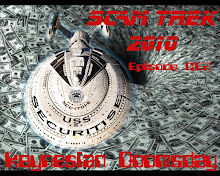



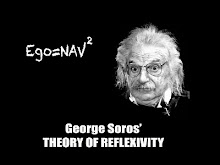

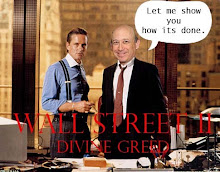



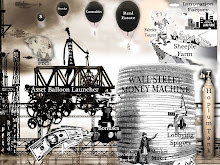
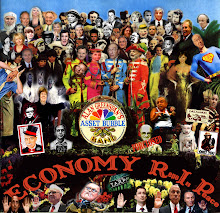



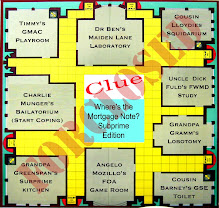





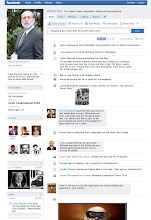
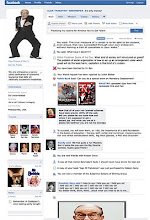
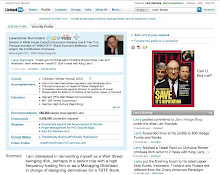




.jpg)



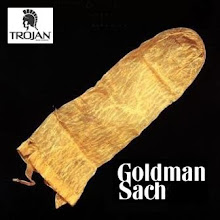



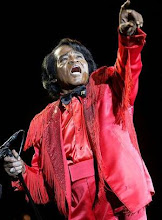




Your words on Chuck were far too kind.
ReplyDeleteI hope Chuck fell on that spear.